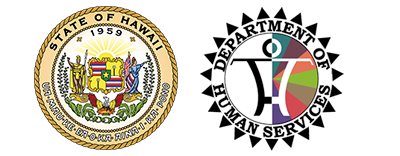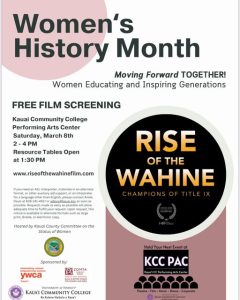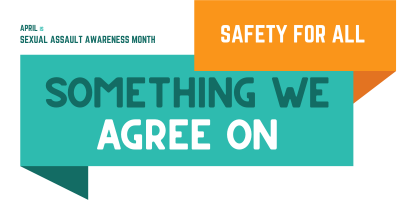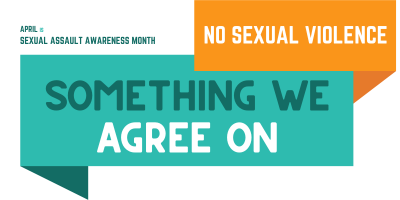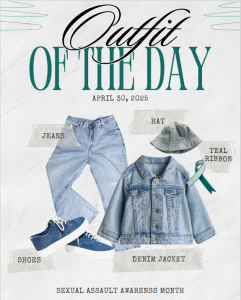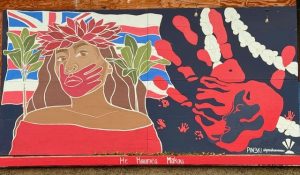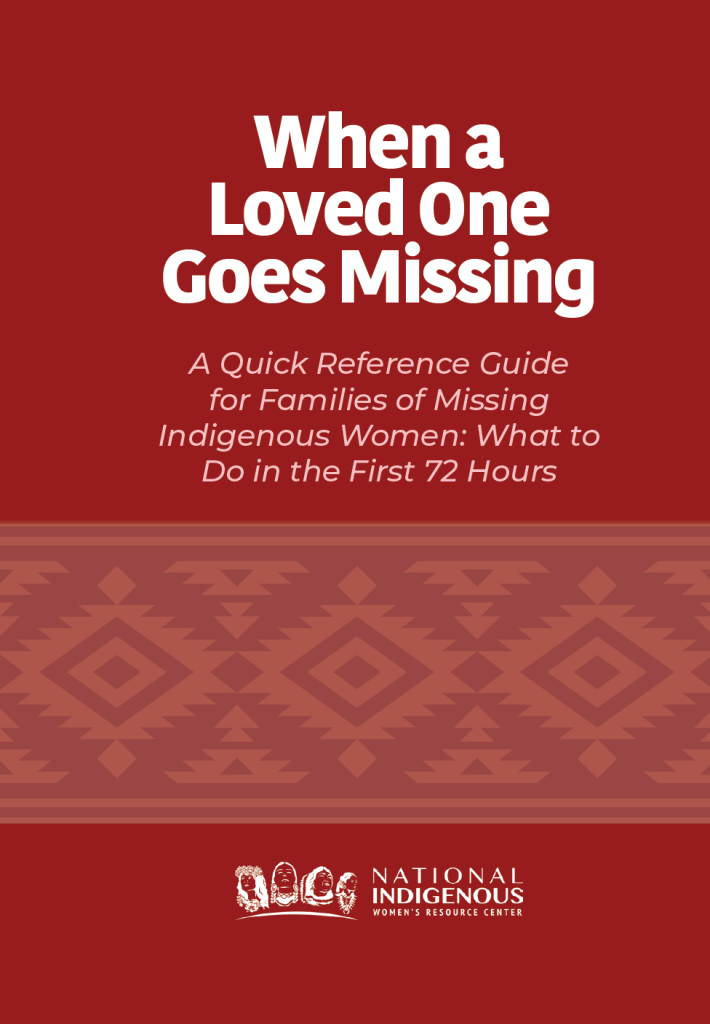Hawaiʻi State Commission on the Status of Women
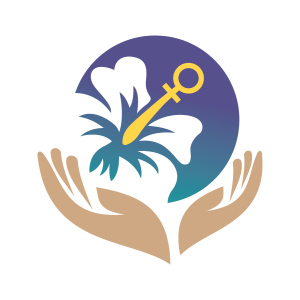 HEALTH. SAFETY. OPPORTUNITY. PROGRESS.
HEALTH. SAFETY. OPPORTUNITY. PROGRESS.
The Hawai‘i State Commission on the Status of Women (HRS 367) is a statewide feminist government body that works toward equality for women and girls in the State by acting as a catalyst for positive change through advocacy, education, collaboration and program development.
Created by executive order on May 15, 1964, to function as a central clearinghouse of resources, information, and advocacy for women and girls, the HSCSW assists with public awareness, policy development, and technical assistance, on a broad range of issues.
Executive Director Llasmin Chaine, and more information, is available via phone at (808) 586-5757 or an email to [email protected].
Statutory Goals and Strategic Priorities:
- Political, economic, and social equality for women and girls.
- Health, safety, equity and access to care.
- Protections against discrimination and gender-based violence.
- State policymaking and programs inclusive of women and girls’ viewpoints, experiences and needs.
- Viable and visible female contributions, achievements, and leadership in Hawai‘i.
- Actions, remedies, and data-driven decision making, to empower, understand and address barriers.
MEMBERSHIP, MEETINGS, and MATERIALS
The Commission consists of thirteen members. Seven are appointed by the Governor*, one from each of the counties of Hawai‘i, Maui, and Kaua‘i, and four members from Oahu. The remaining six Commission members are Ex officio nonvoting members (HRS 367-2). Current Commissioners include:
- Jennifer Stotter, PhD – Chair (Hawai‘i County)
- Stacey Moniz (Maui County)
- Edith Ignacio Neumiller (Kaua‘i County)
- Rose Medina Kemna (Oahu)
*To apply for a position as a Commissioner, click on “Boards and Commissions” on the Governor’s page.
Meetings and Materials:
Next meeting: Monday, February 2, 2026, 11:00 a.m. – 1:00 p.m.
2026
2025
- HSCSW Agenda December 10, 2025
- HSCSW Agenda August 25, 2025
- HSCSW Agenda July 7, 2025
- HSCSW Agenda May 12, 2025
- HSCSW Agenda March 10, 2025
TASK FORCES, COMMITTEES, COALITIONS & WORK GROUPS:
- Hawai‘i Women’s Coalition
- Hawai‘i Coalition for Civil Rights
- Judiciary Working Group on the Effectiveness of Temporary Restraining Orders, Protective Orders, and Harassment by Stalking in Preventing Continued Abuse and Harassment (HCR 55)
- Data Sharing and Governance Working Group (Act 154)
- Department of the Attorney General’s Violence Against Women Act State Planning Committee
- Hawai‘i Maternal and Infant Health Collaborative – Strategy & Research Workgroup
- Commercial Sexual Exploitation of Children Steering Committee
County Committees, & University of Hawai‘i Commission, on the Status of Women:
- Honolulu County Committee on the Status of Women
- Hawai‘i County Committee on the Status of Women
- Kauai County Committee on the Status of Women
- Maui County Committee on the Status of Women
- University of Hawai‘i Commission on the Status of Women
YOUR RIGHTS UNDER STATE STATUTE
Civil Rights
Gender Identity and Expression; and Sexual Orientation are protected classes in the state of Hawai‘i with regards to the Hawai‘i Revised Statutes (HRS) listed below.
Hawai‘i Civil Rights Commission (HCRC) – Website, TEL: (808) 586-8636, [email protected] .
HCRC enforces state laws prohibiting discrimination in employment (H.R.S. Chapter 378, Part I), housing (H.R.S. Chapter 515); public accommodations (H.R.S. Chapter 489), and access to state and state-funded services (H.R.S. section 368-1.5). The HCRC receives, investigates, conciliates, and adjudicates complaints of discrimination.
Services that HCRC provides (video) select your language below:
Check out the UH Commission on the Status of Women’s Joint Statement of Solidarity & Commitment to Nondiscrimination.
Sexual Assault Victims’ Rights
A sexual assault victim has the right to receive a medical forensic examination, regardless of whether the victim chooses to report the assault to a law enforcement agency. They also have the right to notification when there is any major development in a case that the victim reported to a law enforcement agency, as defined in section 801D-2, including whether the case has been closed or reopened. Additional victims’ rights are outlined in H.R.S. section 844G-7.
Additional information for survivors, including available services, can be found at:
-
- Hawai‘i Coalition Against Sexual Assault – Statewide Survivor Service Providers
- Hawai‘i State Coalition Against Domestic Violence – State and Local Resources
- Hawai‘i Sexual Assault Response and Training Program – Sexual assault FAQs and What to do if sexually assaulted
Annual Calendar
In addition to proposing and advocating for legislation that supports the advancement of women and girls, the HSCSW focuses on specific issues during designated months. Please check this site for scheduled events and pertinent resources, that can be used as is or adapted.
If you have an upcoming event in Hawai‘i, recognizing one of the designated days or months listed below, and you would like the HSCSW to post your event’s details below, please send an email to [email protected] for consideration.
- January – National Human Trafficking Awareness Month, and the Women’s Legislative Caucus Breakfast
-
- 2026 Women’s Legislative Caucus Breakfast – Wednesday, January 28, 2026, Doors open: 7:15 a.m., Registration Link
- March – Women’s History Month, Girls Day (March 3), and International Women’s Day (March 8)
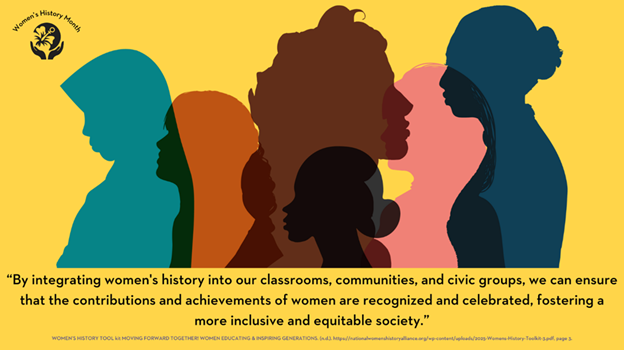
-
- Kaui County Committee on the Status of Women (Saturday, March 8, 2026): FREE FILM SCREENING of Rise of the Wahine – Champions of Title IX at the Kauai Community College, Performing Arts Center, Resource Tables Open at 1:30 p.m., and the Film screens at 2 p.m.
-
- Women’s History Month: The National Women’s History Alliance (NWHA) has created a 2025 Women’s History Toolkit to provide practical guidance and resources for educators, community activists, parents, and volunteers to engage students in exploring and celebrating women’s history.
-
- Girls Day (March 3): To learn the story behind Girls Day in Hawai‘i (and get a mochi recipe), check out this 2020 article How We Celebrate Girls’ Day in Hawaiʻi from Hawaii Magazine.
-
- International Women’s Day (March 8): International Women’s Day (IWD) has been around for over a hundred years, as have many of the issues still impacting women’s advancement. Since 1911, IWD belongs to all who care about women’s equality. Celebrate women’s achievement. Raise awareness about discrimination. Take action to forge gender parity. Free IWD Resources and Toolkit.
_______________________________________________________________________________

- April – Sexual Assault Awareness Month (SAAM) and Denim Day (the last Wednesday in April).
- Sexual Assault Awareness Month (SAAM): The National Sexual Violence Resource Center (NSVRC) has released a comprehensive set of resources designed to support SAAM event and campaign planners in creating impactful outreach, education, and activism initiatives. These resources include a downloadable SAAM Proclamation, the popular #30DaysofSAAM social media challenge, and updated educational factsheets to enhance your efforts. Learn More.
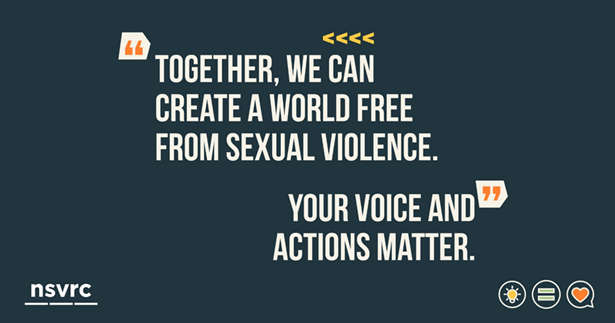
-
-
- Local SAAM Resource – SAAM Email Banners/Signatures:
-
-
- Denim Day (the last Wednesday in April)
- May – National Day of Awareness for Missing and Murdered Indigenous Women and Relatives (May 5), National Women’s Health Week
-
-
- The National Indigenous Women’s Resource Center (NIWRC) states: May 5th has been lifted as the National Day of Awareness for Missing and Murdered Indigenous Women and Relatives (MMIWR) in honor of Hanna Harris, a 21-year-old who went missing and was later found murdered on the Northern Cheyenne Reservation in 2013. These disappearances and murders are often directly connected to domestic violence, dating violence, sexual assault, stalking, and sex trafficking—forms of violence that are deeply linked to the crisis of missing and murdered Indigenous women and relatives. Native families, advocates, and Tribal Nations have risen to confront the silence, tolerance, and government inaction surrounding MMIWR. 2022 OHA Board Chair Statement.
-
-
-
- NIWRC MMIW Toolkit for Families and Communities: A Quick Reference Guide for Families of Missing Indigenous Women: What to Do in the First 72 Hours
-
-
- National Women’s Health Week (May 11 to 15, 2025): CDC Women’s Health states: National Women’s Health Week starts each year on Mother’s Day. This health observance encourages women and girls to make their health a priority. Taking care of yourself includes caring for your physical, mental, social, and emotional health. There’s a lot that you can do – from practicing healthy habits to making and keeping all health care appointments. Practice healthy behaviors to get the care you need. Learn more.
- September – Women’s Health Month
- October – Domestic Violence Awareness Month
Data and Resources
For Youth
For Women
Political and Leadership Resources
Applications for Hawai‘i Boards and Commissions
The Office of the Governor oversees more than 160 boards and commissions established by the state constitution, statutes or executive orders, providing an opportunity for a cross-section of Hawaii residents to offer vital input. The Governor’s team is looking for exceptional individuals who are dedicated to continuing the State of Hawaii’s momentum toward a strong and sustainable economy, and are committed to investing in the people of Hawaii and our statewide community.
Ready to Run
Created by the Center for American Women and Politics to train women in candidates, Ready to Run™ is a non-partisan campaign training program to encourage women to run for elective office, position themselves for appointive office, work on a campaign, or get involved in public life in other ways. Central to the Ready to Run™ model is an innovative, comprehensive curriculum that incorporates the political culture and climate of the locale and uses state and local campaign experts to highlight the specifics of running in a particular state or region. The program demystifies the process of running for elected office, encourages more women to mount campaigns, and introduces them to elected and appointed leaders, campaign consultants, and party officials in their state to whom they can turn as they get ready to run. CAWP’s model curriculum covers fundraising, positioning oneself for elected office, navigating the political party structure, media training, the nuts and bolts of organizing a campaign, mobilizing voters, and crafting a message.
Center for American Women in Politics
The Center for American Women and Politics (CAWP), a unit of the Eagleton Institute of Politics at Rutgers, The State University of New Jersey, is nationally recognized as the leading source of scholarly research and current data about American women’s political participation. Its mission is to promote greater knowledge and understanding about women’s participation in politics and government and to enhance women’s influence and leadership in public life. CAWP’s education and outreach programs translate research findings into action, addressing women’s under-representation in political leadership with effective, imaginative programs serving a variety of audiences.
Archival Information
Act 110 – Patsy Mink Equal Opportunity in Education Act (Title IX)
Act 248 – Protection for Domestic Workers in Hawaiʻi
Act 248*, enacted in 2013, amends our state fair employment law to protect domestic workers against employment discrimination in terms, conditions, and privileges of employment, but not hiring and firing. Under the new law, it is illegal for an employer to discriminate against a domestic employee in compensation or in terms, conditions, or privileges of employment because of race, sex, including gender identity or expression, sexual orientation, age, religion, color, ancestry, disability, or marital status. Under this new statutory protection, employers of domestics can choose who they want to work in their home or residence, and can hire and fire for any reason. *Act 248, 2013 Session, §§ 1-2, amending Hawai‘i Revised Statutes §§ 378-1 and 378-2
Act_206 – Protection for Domestic Violence and Sexual Assault Survivors in the Workplace
In 2011, the state of Hawai‘i enacted Act 206 to protect the employment rights of victims of domestic and sexual violence by: (1) prohibiting employment discrimination on the basis of domestic or sexual violence victim status under H.R.S. chapter 378, part I “Discriminatory Practices”; and (2) amending H.R.S. chapter 378, part VI, formerly titled “Victims Leave” and renamed “Victims Protections”, to add a sub-part requiring employers to make reasonable accommodations for employees who are victims of domestic or sexual violence. Act 206
took effect on January 1, 2012.
Survivors Not Criminals Law — supporting all people in recovery from prostitution, not just sex trafficking victims
The first and only law in the United States to allow any person convicted of prostitution to vacate the conviction, even if they are not a victim of sex trafficking. The defendant can vacate if not convicted of another offense under the Penal Code within three years of the prostitution offense. The law does not extend to buyers and pimps. “We support the decriminalization and destigmatization of prostituting people, but not the system itself or those doing the harm. A criminal record makes it difficult for women to transition into “above-ground employment” and a “life free of stigma,” according to the Hawai‘i State Commission on the Status of Women.”
No License to Discriminate Law — removing the gender binary from Hawaiʻi’s driver’s licenses
Requires a license or state identification card to include a person’s full legal name, date of birth, gender designation, residence address, and license number. Specifies gender designation options of F, M, or X. Act 148 will take effect on July 1, 2020.
Building Bridges, Not Walking on Backs: A Feminist Economic Recovery Plan for COVID-19.
Quick Reference – Hawaiʻi Emergency Rental Assistance Programs
Pushing Through the Pandemic: Pregnant and Birthing During COVID-19 in Hawaiʻi Report
Commitment to the Revitalization of Midwifery and the End of White Supremacy in Hawaiʻi
Gambling with Women’s Safety Report
Understanding Period Poverty in Hawaiʻi Report
A Ten Point Plan for Governer Green and Years to Come
_______________________________________________________________________________
